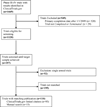Reporting discrepancies between the ClinicalTrials.gov results database and peer-reviewed publications
- PMID: 24687070
- PMCID: PMC4617780
- DOI: 10.7326/M13-0480
Reporting discrepancies between the ClinicalTrials.gov results database and peer-reviewed publications
Abstract
Background: ClinicalTrials.gov requires reporting of result summaries for many drug and device trials.
Purpose: To evaluate the consistency of reporting of trials that are registered in the ClinicalTrials.gov results database and published in the literature.
Data sources: ClinicalTrials.gov results database and matched publications identified through ClinicalTrials.gov and a manual search of 2 electronic databases.
Study selection: 10% random sample of phase 3 or 4 trials with results in the ClinicalTrials.gov results database, completed before 1 January 2009, with 2 or more groups.
Data extraction: One reviewer extracted data about trial design and results from the results database and matching publications. A subsample was independently verified.
Data synthesis: Of 110 trials with results, most were industry-sponsored, parallel-design drug studies. The most common inconsistency was the number of secondary outcome measures reported (80%). Sixteen trials (15%) reported the primary outcome description inconsistently, and 22 (20%) reported the primary outcome value inconsistently. Thirty-eight trials inconsistently reported the number of individuals with a serious adverse event (SAE); of these, 33 (87%) reported more SAEs in ClinicalTrials.gov. Among the 84 trials that reported SAEs in ClinicalTrials.gov, 11 publications did not mention SAEs, 5 reported them as zero or not occurring, and 21 reported a different number of SAEs. Among 29 trials that reported deaths in ClinicalTrials.gov, 28% differed from the matched publication.
Limitation: Small sample that included earliest results posted to the database.
Conclusion: Reporting discrepancies between the ClinicalTrials.gov results database and matching publications are common. Which source contains the more accurate account of results is unclear, although ClinicalTrials.gov may provide a more comprehensive description of adverse events than the publication.
Primary funding source: Agency for Healthcare Research and Quality.
Comment in
-
Results in journals often fail to match those on ClinicalTrials.gov, study finds.BMJ. 2014 Apr 1;348:g2503. doi: 10.1136/bmj.g2503. BMJ. 2014. PMID: 24691001 No abstract available.
-
Reporting discrepancies between the clinicaltrials.gov results database and peer-reviewed publications.Ann Intern Med. 2014 Nov 18;161(10):760. doi: 10.7326/L14-5022. Ann Intern Med. 2014. PMID: 25402518 No abstract available.
References
-
- Song F, Parekh S, Hooper L, Loke YK, Ryder J, Sutton AJ, et al. Dissemination and publication of research findings: an updated review of related biases. Health technology assessment (Winchester, England) 2010;14(8):iii, ix–xi, 1–193. - PubMed
-
- Zarin DA, Ide NC, Tse T, Harlan WR, West JC, Lindberg DAB. Issues in the Registration of Clinical Trials. JAMA: The Journal of the American Medical Association. 2007;297(19):2112–2120. - PubMed
-
- Tse T, Williams RJ, Zarin DA. Reporting “Basic Results” in ClinicalTrials.gov. Chest. 2009;136(1):295–303. - PMC - PubMed
-
- Clinical Trial Registry Numbers in MEDLINE®/PubMed® Records. US National Library of Medicine. 2011 Available from: http://www.nlm.nih.gov/bsd/policy/clin_trials.html.
Publication types
MeSH terms
Grants and funding
LinkOut - more resources
Full Text Sources
Other Literature Sources
Medical

